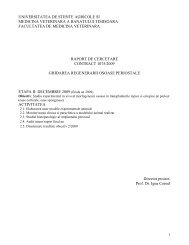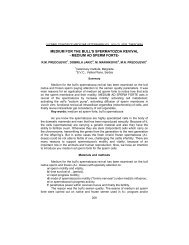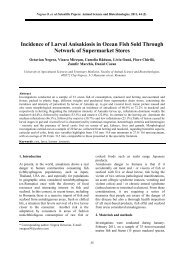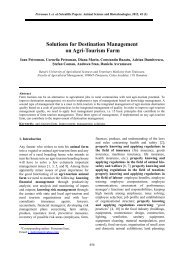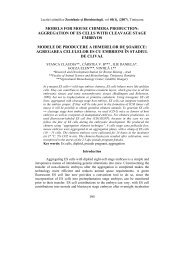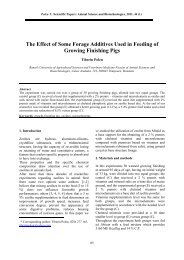journal of linguistic studies
journal of linguistic studies
journal of linguistic studies
You also want an ePaper? Increase the reach of your titles
YUMPU automatically turns print PDFs into web optimized ePapers that Google loves.
socio<strong>linguistic</strong> character, they largely depend on the communication surroundings, on the<br />
topic which is being discussed, on the viewpoints <strong>of</strong> the speaker and the listener, on the<br />
cultural and civilizational level and on a number <strong>of</strong> other factors. Thus euphemisms avoid<br />
the possibility <strong>of</strong> clear and precise defining, so the definitions which are <strong>of</strong>fered in<br />
different dictionaries <strong>of</strong>ten differ significantly. 2 Or, as it was emphasized by Branko<br />
Kuna:<br />
“…(euphemisms) are diversely evaluated and graded, and they can be regarded<br />
as indicators <strong>of</strong> language elegance, <strong>of</strong> political correctness, <strong>of</strong> respect <strong>of</strong> the right<br />
to be different, <strong>of</strong> verbal hygiene, but also as a means <strong>of</strong> ideological<br />
manipulation: by distorting, falsifying or concealing the reality (truth).” (Kuna<br />
2007) 3<br />
Although in the daily communication “the process <strong>of</strong> euphemization is almost a<br />
condition without which any adequate, appropriate and socially acceptable speech is<br />
hardly conceivable” 4 , some <strong>of</strong> the basic characteristics <strong>of</strong> euphemisms undoubtedly<br />
indicate the possibility <strong>of</strong> abuse <strong>of</strong> these expressions, especially if they are used in media,<br />
<strong>of</strong> whose <strong>journal</strong>ist functional style they are an inseparable part. In this way, media can<br />
exercise considerable influence on the formation, transformation or (re)direction <strong>of</strong> public<br />
opinion, on the political stability or instability, on the acceptance or rejection <strong>of</strong> certain<br />
actions <strong>of</strong> political parties or institutions <strong>of</strong> government, which can <strong>of</strong>ten have<br />
immeasurable consequences for an area much wider than that which these media directly<br />
address.<br />
2. USAGE OF EUPHEMISMS IN POLITICS, POLITICAL SPEECHES AND<br />
MEDIA<br />
For politics and media euphemisms are especially precious as a means that enables<br />
them to present even the most unpopular contents in a manner that will justify or mitigate<br />
almost every, even the greatest evil, or even proclaim its necessity in the given moment.<br />
There are many examples from the past which clearly illustrate the proportions that the<br />
abuse <strong>of</strong> language can reach.<br />
Hitler’s regime managed for years to hold the majority <strong>of</strong> its people and a good part<br />
<strong>of</strong> the international community in a delusion in respect <strong>of</strong> the real meaning and function<br />
<strong>of</strong> numerous concentration (transit) and labour camps as a means for achieving the final<br />
solution and creation <strong>of</strong> Lebensraum - living space for the Arian race. However the<br />
expression final solution was almost never followed by its second part which completes<br />
the concept and gives it a completely different, true, much more definite and much clearer<br />
meaning – the idea behind this euphemism was in fact the final solution <strong>of</strong> the ‘Jewish<br />
question’ through physical liquidation <strong>of</strong> (not just one) entire nation. It was an act, which<br />
the law identifies as genocide or crime against the humanity and the mankind (yet another<br />
euphemism). These camps were neither common camps for prisoners (or simply prisons)<br />
in which, just as elsewhere around the world, the “unwelcome elements” and the<br />
“opponents” <strong>of</strong> the regime were supposed to be kept under control, nor were they real<br />
work camps in which “the work liberates”; they were places in which millions <strong>of</strong> people<br />
were exposed to extreme humiliation and suffering. The true purpose <strong>of</strong> these places was<br />
for quite a long time concealed behind the mentioned euphemisms, which have<br />
58



